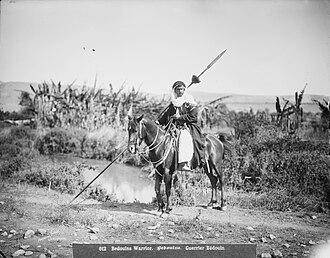Bedouin





Bedouin are a grouping of nomadic Arab peoples who have historically inhabited the desert regions in North Africa, the Arabian Peninsula, Iraq, and the Levant. Their name in Arabic, Bedu, translates to "desert dwellers" in English. The Bedouin culture is rich in traditions and has been influential in the shaping of Arab history and culture.
History[edit]
The origins of the Bedouin trace back to the nomads of the Arabian Peninsula over millennia. Their adaptation to desert life enabled them to thrive in harsh conditions that were inhospitable to others. Historically, Bedouin societies were organized into tribes and clans, which were important for social and political organization. These tribes engaged in both pastoral nomadism, moving with their herds of goats, sheep, and camels in search of grazing land and water, and in some cases, desert agriculture.
The Bedouin played a crucial role in the spread of Islam during the 7th century, as their mobility facilitated the rapid expansion of the Islamic empire. Over centuries, their territories have been affected by changing political borders and the discovery of oil in the Arabian Peninsula, leading to significant changes in their traditional way of life.
Culture[edit]
Bedouin culture is known for its hospitality, poetry, music, and dance. The code of honor, known as Asabiyya, is central to Bedouin ethics, emphasizing loyalty to the family and tribe. Traditional Bedouin tents, known as beit al-sha'ar (house of hair), reflect their nomadic lifestyle, being easy to dismantle, transport, and reassemble. These tents serve as a family home and a symbol of social status within the Bedouin community.
Economy[edit]
Traditionally, the Bedouin economy was based on animal husbandry, with camels being particularly valued for their ability to travel long distances without water. The Bedouin also engaged in trade, facilitating commerce across desert regions. In recent decades, the discovery of oil and the establishment of modern nation-states have led many Bedouin to settle in permanent homes and integrate into the urban economy, although some groups still maintain their nomadic lifestyle.
Modern Challenges[edit]
The transition from a nomadic to a settled lifestyle has presented challenges for the Bedouin, including issues related to identity, cultural preservation, and economic adaptation. In some countries, Bedouin communities face legal and social challenges, including disputes over land rights and access to education, healthcare, and other services.
Conclusion[edit]
The Bedouin are an integral part of the history and culture of the Middle East and North Africa. Despite the challenges of modernization, they continue to maintain their cultural identity and traditions, contributing to the rich tapestry of the region's heritage.
Ad. Transform your life with W8MD's Budget GLP-1 injections from $75


W8MD offers a medical weight loss program to lose weight in Philadelphia. Our physician-supervised medical weight loss provides:
- Weight loss injections in NYC (generic and brand names):
- Zepbound / Mounjaro, Wegovy / Ozempic, Saxenda
- Most insurances accepted or discounted self-pay rates. We will obtain insurance prior authorizations if needed.
- Generic GLP1 weight loss injections from $75 for the starting dose.
- Also offer prescription weight loss medications including Phentermine, Qsymia, Diethylpropion, Contrave etc.
NYC weight loss doctor appointmentsNYC weight loss doctor appointments
Start your NYC weight loss journey today at our NYC medical weight loss and Philadelphia medical weight loss clinics.
- Call 718-946-5500 to lose weight in NYC or for medical weight loss in Philadelphia 215-676-2334.
- Tags:NYC medical weight loss, Philadelphia lose weight Zepbound NYC, Budget GLP1 weight loss injections, Wegovy Philadelphia, Wegovy NYC, Philadelphia medical weight loss, Brookly weight loss and Wegovy NYC
|
WikiMD's Wellness Encyclopedia |
| Let Food Be Thy Medicine Medicine Thy Food - Hippocrates |
Medical Disclaimer: WikiMD is not a substitute for professional medical advice. The information on WikiMD is provided as an information resource only, may be incorrect, outdated or misleading, and is not to be used or relied on for any diagnostic or treatment purposes. Please consult your health care provider before making any healthcare decisions or for guidance about a specific medical condition. WikiMD expressly disclaims responsibility, and shall have no liability, for any damages, loss, injury, or liability whatsoever suffered as a result of your reliance on the information contained in this site. By visiting this site you agree to the foregoing terms and conditions, which may from time to time be changed or supplemented by WikiMD. If you do not agree to the foregoing terms and conditions, you should not enter or use this site. See full disclaimer.
Credits:Most images are courtesy of Wikimedia commons, and templates, categories Wikipedia, licensed under CC BY SA or similar.
Translate this page: - East Asian
中文,
日本,
한국어,
South Asian
हिन्दी,
தமிழ்,
తెలుగు,
Urdu,
ಕನ್ನಡ,
Southeast Asian
Indonesian,
Vietnamese,
Thai,
မြန်မာဘာသာ,
বাংলা
European
español,
Deutsch,
français,
Greek,
português do Brasil,
polski,
română,
русский,
Nederlands,
norsk,
svenska,
suomi,
Italian
Middle Eastern & African
عربى,
Turkish,
Persian,
Hebrew,
Afrikaans,
isiZulu,
Kiswahili,
Other
Bulgarian,
Hungarian,
Czech,
Swedish,
മലയാളം,
मराठी,
ਪੰਜਾਬੀ,
ગુજરાતી,
Portuguese,
Ukrainian
